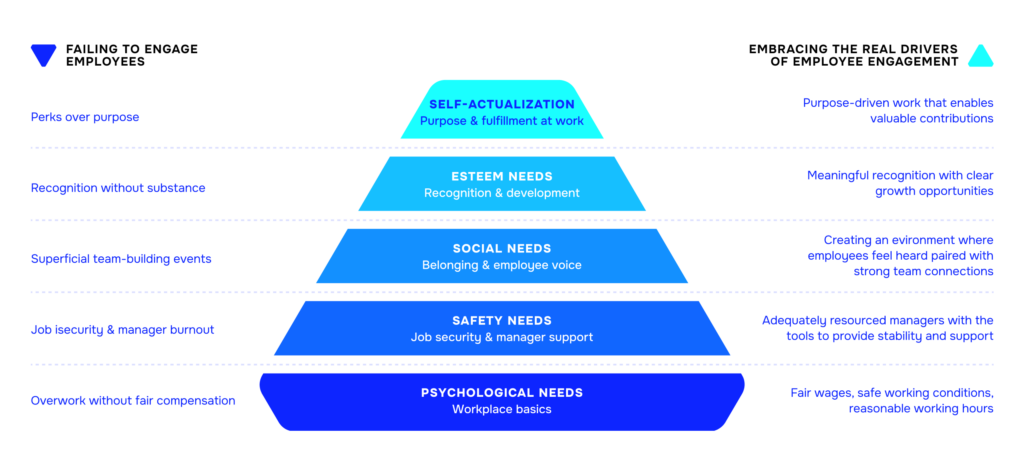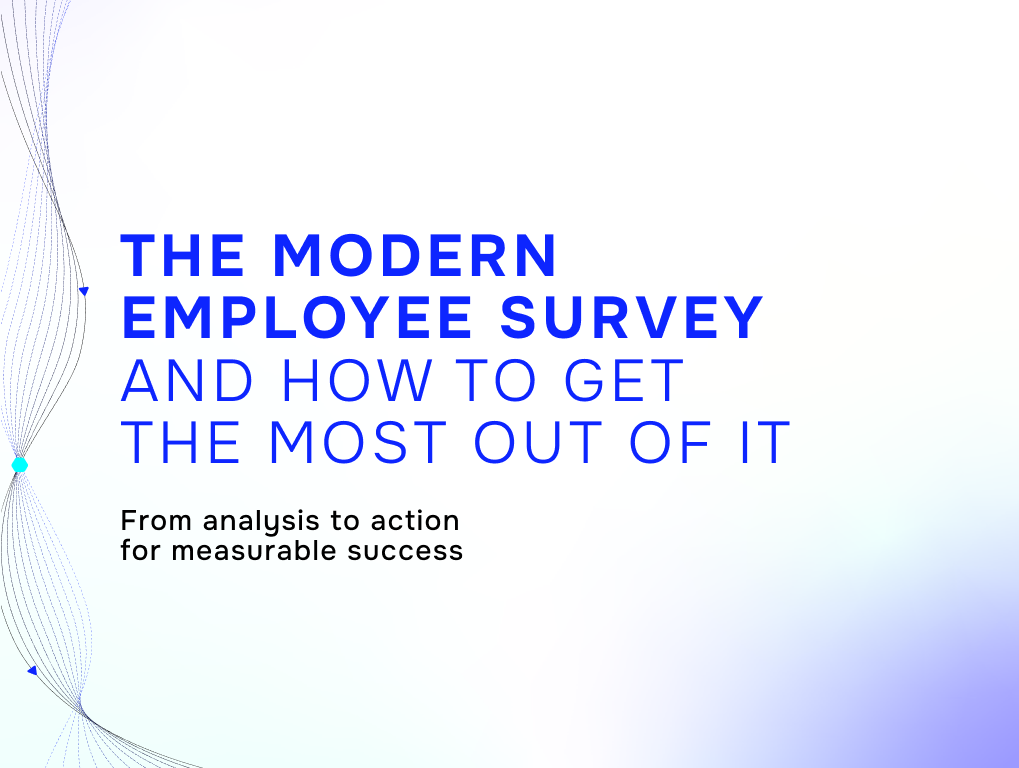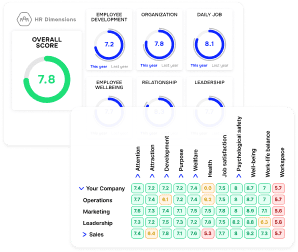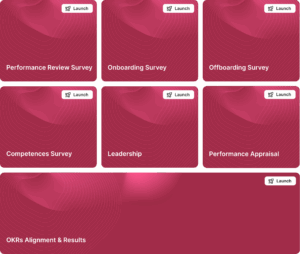Employee Engagement as a Key to Business Success: A Strategic Perspective
According to the latest Gallup study, employee engagement in the United States is at its lowest level since 2014: only 31% of employees are engaged.
Employee engagement is a key driver of business success that is often underestimated. Gallup’s research shows that highly engaged teams can be up to 21% more profitable.
Employee engagement fosters a strong sense of loyalty, motivating employees to perform at their best. At the same time, it helps reduce stress and build resilience – two essential elements for maintaining a dynamic work environment.
In today’s world, engagement is no longer just an HR concern but it has become a strategic priority crucial for businesses success. With the right tools and data, engagement can not only be cultivated but also quantified. This is where atwork excels, seamlessly integrating people, data, and technology to drive measurable business results.
What Is Employee Engagement and Why Is It Important?
Employees demonstrate true engagement when they are fully invested in their work –emotionally, mentally, and physically. To better understand this concept, consider the idea of working with the “head, heart, and hands”:
- Head: Cognitive focus and goal-oriented thinking.
- Heart: Emotional connection and passion for the work.
- Hands: Physical effort and dedication.
Well-engaged employees do more than simply completingtasks. They take initiative, assume responsibility, and actively contribute to the company’s success.
This level of commitment directly impacts important HR metrics, including reduced turnover, fewer absences, and improved productivity. Ultimately, these benefits translate into higher profitability and greater customer satisfaction.
For Example: Sarah, a marketing manager who consistently contributes innovative campaign ideas, volunteers for new projects, and motivates her team to achieve creative excellence. On the other hand, her colleague Tim only meets the bare minimum requirements, avoids teamwork, and rarely participates in meetings.
So, what is the difference? Sarah’s engagement not only boosts her individual performance but also enhances team dynamics and drives positive workplace culture.
By leveraging data-driven analyses, atwork helps organizations identify the specific factors that influence the engagement of employees like Sarah and Tim. With this insight, companies can implement targeted initiatives that lead to higher productivity, stronger teams, and measurable success. In this way, engagement becomes more than a concept—it becomes a powerful competitive advantage.
Employee Engagement as a Growth Driver
Employee engagement should not be seen only as a “soft” factor because it has a direct and measurable impact on business success. Lack of engagement can lead to significant financial and operational setbacks. A Gallup study revealed that disengagement causes $450–500 billion in annual losses to businesses in the U.S. alone due to reduced efficiency, high turnover, and increased absenteeism. Moreover, these issues can severely impact a business’s ability to compete in the market.
The critical role of engagement becomes even more apparent during times of crisis. As, engaged teams are better equipped to adapt, respond flexibly to challenges, and actively contribute to their organization’s resilience and long-term adaptability.
atwork as a trusted partner helps businesses understand these important correlations.
By offering data-driven insights and actionable strategies, atwork enables businesses to identify these connections and implement targeted solutions. Based on these findings businesses can more effectively align HR initiatives and obtain desired business outcomes. After all, the key to sustainable success is engagement.
If you want to learn how to strengthen employee engagement and build a loyal workforce, read our informative article: “How to Strengthen Employee Engagement and Build a Loyal Workforce.”
The Drivers of Employee Engagement: A Guide for HR Leaders
Employee engagement is influenced by a variety of factors, and HR leaders can deliberately manage these factors to improve business performance. Based on our 2024 surveys, the most important factors are the following:
- Leadership competence: Inspiring leaders build trust and increase motivation.
- Recognition and appreciation: Regular feedback and rewards strengthen emotional ties.
- Career development: Clear development opportunities encourage long-term motivation.
- Work-life balance: Flexible work models contribute to employee satisfaction and productivity.
A visual model, such as a pyramid of engagement drivers, can help prioritize these factors effectively.

People Are Unique, and What Motivates Them or Drives Their Engagement Varies Greatly
Keeping in mind each employee’s uniqueness and individuality, it is crucial to identify the specific factors that matter most to them. Moreover, customized engagement approach ensures that every employee feels valued and empowered, ultimately leading to greater productivity and overall business success.
atwork helps companies pinpoint and optimize these individual drivers of engagement using data-driven analytics. By simultaneously addressing the personal needs of employees and the unique requirements of the organization, atwork creates a highly motivated and deeply engaged workforce.
Challenges in Promoting Engagement
It is also important to note that promoting employee engagement comes with its challenges. Among the most common are the following:
- Hybrid work models: Maintaining the connection between in-office employees and remote teams requires creative approaches.
- Generational differences: Different age groups have varying expectations regarding work.
- Leadership issues: Not all leaders are sufficiently trained to effectively promote engagement.
However, the good news is data-driven strategies provide solutions to these challenges/issues. We can help you overcome these challenges in a breeze. atwork identifies these issues using tools, surveys, and research, and then determines the influencing factors and defining characteristics of a team or company. Based on this, atwork you develop targeted measures that will remove barriers and significantly increase engagement.
From Insight to Action: Strategies with Real Impact
There is no denying that employee engagement requires clear, strategic actions guided by sound insights. To address this need, atwork offers an effective solution through its “Measure-Act-Impact” Framework:
- Measure: Identify key factors affecting business performance by utilizing scientifically validated surveys and historical data.
- Act: Automatically translate insights into individual, tailored action plans that deliver measurable results based on data and context.
- Impact: Evaluate the effectiveness of these actions on engagement, analyze ROI, and implement precise, targeted initiatives.
By adopting this structured approach, atwork enables companies to convert employee engagement into tangible business outcomes, paving the way for long-term success.
A Practical Example:
A technology company used atwork to analyze engagement scores within its teams. By implementing targeted measures to improve the dimension “Daily Job” (listed under the “Health Indicator” column in the table) and its associated subdimensions, “Skill Use” and “Job Meaningfulness” (under the “Action Area” column), the company achieved a noticeable improvement in employee retention, with some teams seeing an increase of up to 20%.
Interestingly, these two subdimensions, “Skill Use” and “Job Meaningfulness,” showed the strongest and most effective connection to improving Daily Job and overall engagement scores (0.17 and 0.16, respectively, shown in the “Influence” column in the table).
For instance, an improvement of 1.5 points in Skill Use and Job Meaningfulness correlated with a 0.3-point increase in overall engagement on a 10-point scale. This example illustrates how atwork’s data-driven methods can produce measurable, meaningful improvements in employee engagement.
atwork: Turning Engagement into a Driver of Business Success
atwork seamlessly combines precise analytics with practical, results-oriented solutions to turn employee engagement into a measurable and impactful metric that facilitates business success. Therefore, by implementing targeted initiatives with help of atwork, organizations can enhance their employee retention and satisfaction and encourage innovation and boost productivity.
We understand that engagement is a critical success factor for sustainable growth and will help you achieve long-term strength through enhanced engagement.
The Future of Employee Engagement
Please note that employee engagement is not a one-time initiative – it is a continuous process that requires data, strategy, and, most importantly, commitment from leadership. Companies that prioritize engagement build a foundation for long-term success, resilience, and innovation.
Learn more about Josh Bersin’s Revolutionizing Guide for Business Success in our article: “Employee Data Meets Business Strategy.”
An engaged workforce is more productive, which helps build a healthy company culture and ensure sustainable growth.
If you want to leverage this true competitive advantage in the fast-changing work environment choose atwork – we make employee engagement more manageable and measurable.
You may also like

Engaged to Care: Transforming Swiss Hospital Workforces through AI and Strategy
Swiss hospitals are facing rising burnout, absenteeism, and disengagement among staff — but AI-powered tools could be the key to turning things around. This study, conducted by students at Lucerne University of Applied Sciences and Arts in collaboration with atwork, explores how strategic HR technology can help transform employee engagement in the healthcare sector.

Optimizing Employee Engagement through Modern Surveys
Equip yourself with the knowledge and tools to drive organizational success and create a thriving workplace culture.

How do you get meaningful results from employee surveys?
We all know what it’s like: you get surveys in your e-mail inbox, requesting you to evaluate a service or your own employer. The questions and answers you can select are often the same. So, most people just sign off. A low response rate is not only irritating. If the rate is too low, the […]





 Guides
Guides  Studies
Studies